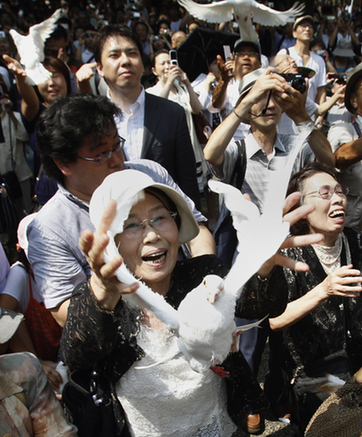Asia-Pacific
Japan PM shuns shrine, apologizes at ceremony
(China Daily)
Updated: 2010-08-16 06:42
 |
Large Medium Small |
TOKYO - Japan's new liberal prime minister shunned a visit to a shrine that has outraged Asian neighbors for honoring war criminals, breaking from past governments' tradition and instead apologizing on Sunday for the suffering World War II caused.
 A woman releases a dove for peace at the Yasukuni Shrine for war dead in Tokyo on Sunday, the anniversary of Japan’s surrender in World War II. [Agencies] |
Members of the now-opposition Liberal Democratic Party, which ruled Japan nearly continuously since the end of the war, made a point by carrying out their own trip to Yasukuni Shrine in Tokyo on the 65th anniversary of the end of World War II.
Among those who visited Yasukuni was LDP leader Sadakazu Tanigaki and former Prime Minister Shinzo Abe. About 40 legislators went to the shrine, but none from Prime Minister Naoto Kan's Cabinet, according to Japanese media reports.
It is the first time since the end of World War II that the entire Japanese Cabinet has avoided visiting Yasukuni on Aug 15, the day Japan surrendered in the war. "We caused great damage and suffering to many nations during the war, especially to the people of Asia," Kan told a crowd of about 6,000 at an annual memorial service for the war dead at Budokan hall in Tokyo.
"We feel a deep regret, and we offer our sincere feelings of condolence to those who suffered and their families," he said. "We renew our promise to never wage war, and we promise to do our utmost to achieve eternal world peace and to never repeat again the mistake of war."
Among those listening to Kan's words were Emperor Akihito, whose father Hirohito announced the surrender 65 years ago in a radio broadcast - the first time the Japanese public had heard the real voice of the emperor, who had been revered as a living god to justify imperial expansion.
Akihito, who has never visited Yasukuni, led a moment of silence at noon, bowing deeply before a stage filled with yellow and white chrysanthemums.
The families and friends of more than 3 million Japanese who died in war, including a gray-haired woman in a wheelchair clutching a black-and-white photo of a soldier, bowed their heads in silence for a minute.
"I don't ever want war," said the woman, Chiyoka Takakura, 96, whose husband died in the Philippines. "I am asking his spirit to protect us all."
Takakura and others, mostly elderly but some younger mourners remembering older family members, each placed a chrysanthemum on the stage.
"I feel once again a deep sadness for those many who lost their precious lives and for their families," Akihito said, attending the ceremony with his wife Michiko. "I pray for the continued prosperity of our nation and for world peace."
In Seoul, South Korean President Lee Myung-bak, speaking on Sunday before a crowd packing a plaza near the former royal palace, said history should not be forgotten but urged Japan and his nation to work together for a new future.



